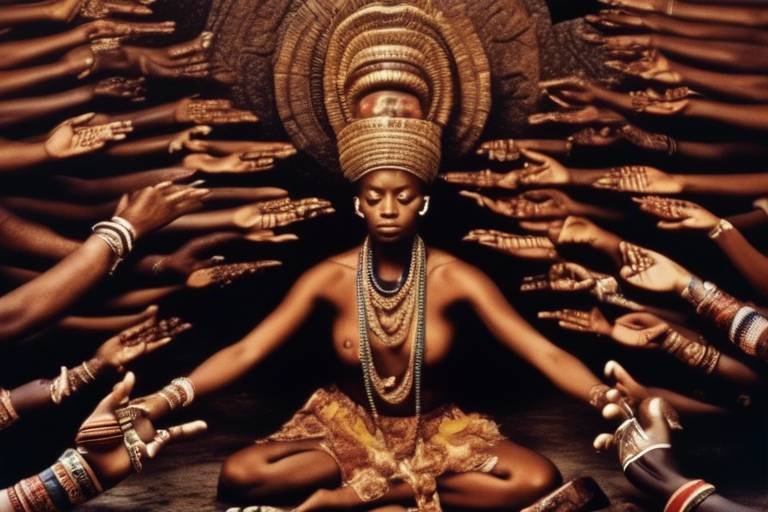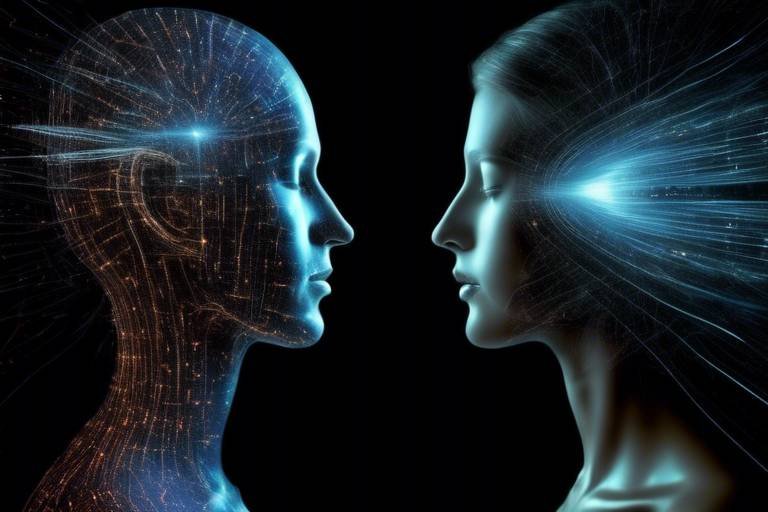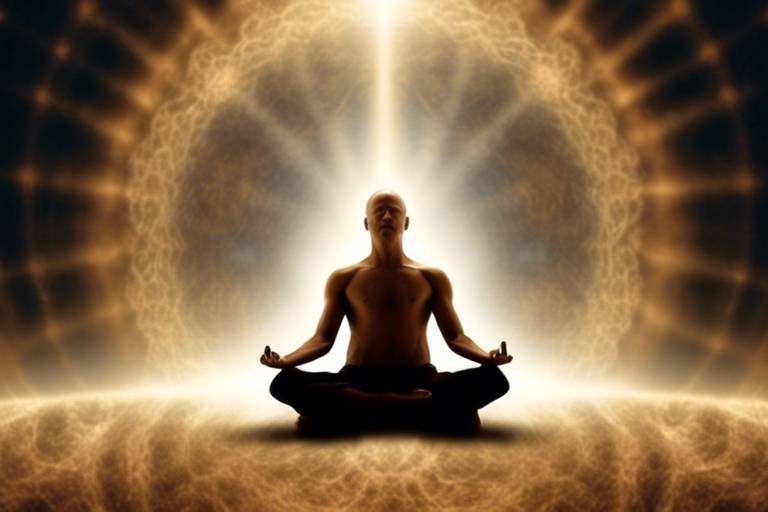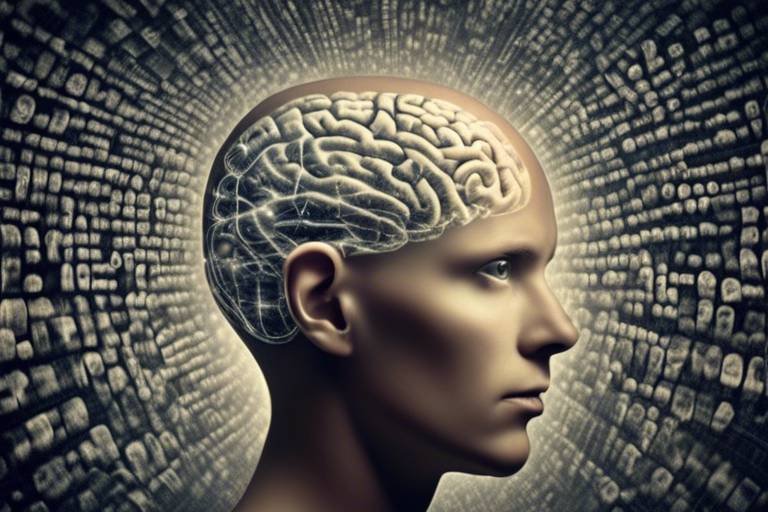Mysticism and Consciousness - A Holistic Approach
Have you ever found yourself pondering the deeper meanings of life, or perhaps feeling a sense of connection to something greater than yourself? If so, you're not alone. The exploration of mysticism and consciousness has captivated human minds for centuries, weaving together threads of spirituality, philosophy, and science. In this article, we will embark on a fascinating journey to unravel the intricate relationship between these two profound concepts. We'll delve into their definitions, historical contexts, and how they interconnect to shape our understanding of reality and spiritual experiences.
Mysticism, at its core, can be understood as a quest for a direct experience of the divine or ultimate reality. It's like trying to touch the intangible, to grasp the essence of existence beyond the mundane. Across various cultures and religions, mysticism manifests in diverse forms, from the meditative practices of Buddhism to the ecstatic rituals of Sufism. Each tradition offers unique insights into the nature of the divine and the human experience, often leading to profound personal transformations.
On the other hand, consciousness is a complex and multifaceted phenomenon that has intrigued thinkers from various fields. It encompasses our awareness of ourselves and our surroundings, shaping how we perceive reality. Imagine consciousness as the stage upon which the play of life unfolds—a dynamic interplay of thoughts, feelings, and sensations that colors our experiences. The exploration of consciousness reveals not only the depths of human thought but also the potential for spiritual awakening and growth.
As we navigate through this article, we will examine the philosophical perspectives that seek to explain consciousness, from the age-old mind-body problem to contemporary scientific inquiries. We'll explore how Eastern philosophies, particularly Buddhism and Hinduism, offer unique interpretations of consciousness and its significance in spiritual practices. Furthermore, we'll delve into the altered states of consciousness that often accompany mystical experiences, examining the roles of meditation and psychedelics in facilitating these transformative states.
By the end of our journey, we hope to illuminate the profound interconnectedness of mysticism and consciousness, inviting you to reflect on your own spiritual path and the mysteries that lie within. So, are you ready to dive deep into the realms of the mystical and the conscious? Let’s embark on this enlightening exploration together!
- What is mysticism? - Mysticism refers to spiritual practices aimed at achieving a direct connection with the divine or ultimate reality.
- How does consciousness relate to spirituality? - Consciousness plays a crucial role in shaping our spiritual experiences and self-awareness, influencing how we perceive and interact with the world.
- What are altered states of consciousness? - Altered states of consciousness are different states of awareness that can occur during mystical experiences, often facilitated by practices like meditation or the use of psychedelics.
- Can meditation enhance spiritual experiences? - Yes, meditation is a fundamental practice in many mystical traditions and can deepen states of consciousness, enriching spiritual insight.

Understanding Mysticism
Mysticism is a fascinating and complex realm that transcends the boundaries of conventional spirituality. At its core, mysticism encompasses various spiritual practices and experiences aimed at achieving a direct connection with the divine or the ultimate reality. This pursuit often leads individuals to explore the depths of their consciousness, seeking a profound understanding of existence itself. But what exactly does mysticism entail? Let's dive deeper into its definitions, types, and significance across different cultures.
To start, mysticism can be defined as a spiritual experience that goes beyond ordinary perception. It often involves an intense personal encounter with the divine, characterized by feelings of unity, transcendence, and deep insight. Many mystics describe their experiences as moments when they feel completely at one with the universe, where the barriers between self and other dissolve. This sense of connection is not merely an emotional experience; it often brings about a radical transformation in the individual's worldview and sense of identity.
Across various cultures, mysticism manifests in diverse forms, each with its own unique practices and beliefs. For instance, in Christianity, mystics like St. John of the Cross and Teresa of Ávila emphasized contemplative prayer and the pursuit of divine union. In Islam, Sufism represents a mystical path that seeks to experience God through love and devotion, often expressed through poetry and dance. Similarly, Buddhism and Hinduism offer rich mystical traditions that explore the nature of consciousness and the self, often through meditation and yogic practices.
Here’s a brief overview of different mystical traditions:
| Tradition | Key Practices | Notable Figures |
|---|---|---|
| Christianity | Contemplative prayer, meditation | St. John of the Cross, Teresa of Ávila |
| Islam | Dhikr (remembrance), poetry, dance | Rumi, Al-Ghazali |
| Buddhism | Mindfulness meditation, Zen practices | Thich Nhat Hanh, D.T. Suzuki |
| Hinduism | Yoga, chanting, meditation | Ramakrishna, Sri Aurobindo |
The significance of mysticism extends beyond individual experiences; it plays a crucial role in personal transformation. By engaging in mystical practices, individuals often report profound changes in their perspectives, leading to increased empathy, compassion, and a sense of purpose. Such transformations can be likened to a caterpillar emerging from its chrysalis—mysticism offers the tools to break free from the constraints of ordinary reality and embrace a more expansive understanding of existence.
Moreover, mysticism serves as a bridge between different cultures and spiritual traditions. It highlights the shared human quest for meaning and connection, reminding us that despite our diverse backgrounds, we all seek a deeper understanding of our place in the universe. In this way, mysticism not only enriches individual lives but also fosters a sense of unity among humanity.
As we continue to explore the intricate relationship between mysticism and consciousness, it becomes clear that the two are deeply intertwined. Mystical experiences often lead to heightened states of awareness and altered perceptions, prompting individuals to question the very nature of reality. This ongoing dialogue between mysticism and consciousness invites us to consider the profound mysteries of existence and our connection to the divine.
- What is the primary goal of mysticism? The primary goal of mysticism is to achieve a direct and personal connection with the divine or ultimate reality, often leading to profound personal transformation.
- Are mystical experiences universal? Yes, mystical experiences are reported across various cultures and spiritual traditions, highlighting a shared human quest for deeper understanding and connection.
- How do mystical practices affect personal growth? Engaging in mystical practices often leads to increased empathy, compassion, and a greater sense of purpose, contributing significantly to personal growth.

The Nature of Consciousness
Consciousness is one of those profound mysteries that has puzzled humanity for centuries. What is it? Where does it come from? Why do we experience the world in such a unique way? These questions have led to countless debates among philosophers, scientists, and spiritual seekers alike. At its core, consciousness can be understood as our awareness of ourselves and our surroundings. It’s that inner voice that narrates our thoughts, feelings, and actions, creating a tapestry of experiences that shape our reality.
To dive deeper into the nature of consciousness, we can explore several key definitions and theories that attempt to capture its essence. For instance, some might define consciousness as a state of being aware of and able to think about one’s own existence, sensations, thoughts, and surroundings. Others may argue that consciousness is not merely a byproduct of brain activity but rather a fundamental aspect of the universe, a perspective that aligns with the philosophical stance of panpsychism.
Throughout history, various cultures and philosophical traditions have contributed to our understanding of consciousness. In Western philosophy, thinkers like René Descartes famously posited a dualistic view, suggesting that the mind and body are distinct entities. This perspective raises intriguing questions about the relationship between our mental states and physical reality. On the other hand, Eastern philosophies, particularly those rooted in Buddhism and Hinduism, often view consciousness as a continuous flow, emphasizing its transient nature and interconnectedness with the universe.
When we consider the implications of consciousness, it becomes clear that it plays a pivotal role in our self-awareness and perception of reality. It shapes our beliefs, influences our decisions, and colors our interactions with others. For instance, have you ever noticed how your mood can alter your perception of a situation? When you're feeling joyful, the world seems brighter, and challenges appear more manageable. Conversely, in times of distress, even the simplest tasks can feel overwhelming. This interplay between consciousness and perception highlights just how dynamic and fluid our experience of reality can be.
Moreover, the quest to understand consciousness has led to various scientific inquiries, particularly within the fields of neuroscience and psychology. Researchers are probing the brain's mechanisms to uncover how consciousness arises from neural processes. This exploration has yielded fascinating insights, revealing that different states of consciousness—such as wakefulness, dreaming, and altered states—are governed by distinct patterns of brain activity.
To summarize the multifaceted nature of consciousness, we can look at some of its key characteristics:
- Subjective Experience: Consciousness is inherently personal; it encompasses our unique perceptions and feelings.
- Dynamic Nature: Our conscious awareness can shift and change based on our thoughts, emotions, and external stimuli.
- Interconnectedness: Many philosophies suggest that consciousness is not isolated but rather interconnected with the broader universe.
Ultimately, understanding consciousness is not just an intellectual pursuit; it invites us to explore the very fabric of our existence. As we continue to investigate this enigmatic phenomenon, we may uncover deeper truths about ourselves and the universe we inhabit.

Philosophical Perspectives on Consciousness
When we dive into the philosophical perspectives on consciousness, we find ourselves navigating a labyrinth of ideas that have puzzled thinkers for centuries. At the heart of this exploration lies the question: what does it mean to be conscious? Different philosophical schools have approached this question in unique ways, each offering a lens through which we can understand our own experiences. For instance, dualism, famously championed by René Descartes, posits that the mind and body are two distinct entities. This perspective suggests that mental phenomena are non-physical and cannot be fully explained by physical processes alone. Imagine your mind as a separate entity, like a ghost in a machine, interacting with the physical world but not being bound by it.
On the other hand, we have materialism, which argues that everything, including consciousness, can be explained through physical processes. According to this view, our thoughts, feelings, and experiences are simply the result of brain activity. This perspective can be likened to a computer: when you press a key, it produces an output based on the underlying hardware and software. In this analogy, consciousness is just the program running on the hardware of our brain.
Then there’s panpsychism, a more recent philosophical stance suggesting that consciousness is a fundamental aspect of all matter. This view posits that everything, from the smallest particle to the largest galaxy, possesses some form of consciousness. Think of it like a tapestry, where every thread contributes to the overall picture of consciousness. This perspective challenges our conventional understanding and invites us to reconsider the nature of existence itself.
Each of these theories has profound implications for how we understand human experience and existence. For instance, if we accept dualism, we might explore the mystical experiences that transcend physical reality. In contrast, materialism could lead us to investigate how brain chemistry influences our spiritual encounters. Meanwhile, panpsychism encourages a more holistic view, suggesting that our consciousness is interconnected with the universe itself.
To further clarify these perspectives, let’s summarize their core ideas in the following table:
| Philosophical Perspective | Key Idea | Implications |
|---|---|---|
| Dualism | Mental and physical are distinct. | Explores mystical experiences beyond the physical realm. |
| Materialism | Everything can be explained through physical processes. | Focuses on brain function and its influence on consciousness. |
| Panpsychism | Consciousness is a fundamental property of all matter. | Encourages a view of interconnected consciousness throughout the universe. |
In conclusion, the philosophical perspectives on consciousness not only enrich our understanding of what it means to be aware but also open the door to deeper inquiries about the nature of reality itself. As we continue to explore these ideas, we may find that the answers we seek are as complex and multifaceted as consciousness itself.
- What is consciousness? Consciousness is the state of being aware of and able to think about one’s own existence, thoughts, and surroundings.
- How do different philosophies define consciousness? Different philosophies offer varying definitions; dualism sees it as separate from the physical, materialism views it as a product of physical processes, and panpsychism considers it a fundamental aspect of all matter.
- Why is understanding consciousness important? Understanding consciousness can help us comprehend human experience, spirituality, and our place in the universe.

The Mind-Body Problem
The mind-body problem is one of the most intriguing philosophical questions that has puzzled thinkers for centuries. At its core, it explores the relationship between our mental states and the physical processes of the body. Imagine your mind as a conductor of an orchestra, where each thought and emotion is a different instrument playing in harmony. But what happens when the music stops? This metaphor encapsulates the essence of the mind-body problem—how do our thoughts, feelings, and consciousness influence our physical existence, and vice versa?
Historically, this dilemma has been approached from various angles, leading to several key theories. Dualism, famously advocated by René Descartes, posits that the mind and body are fundamentally different substances. According to this view, the mind is non-physical and exists independently of the body. On the other hand, materialism argues that everything, including consciousness, can be explained through physical processes. This perspective suggests that our thoughts and feelings are merely byproducts of brain activity, like shadows cast by a light source. Finally, there's panpsychism, an intriguing theory that posits that consciousness is a fundamental feature of all matter, implying that even the simplest particles possess some form of awareness.
To illustrate these concepts, let’s take a look at a simple comparison table:
| Theory | Definition | Key Proponent |
|---|---|---|
| Dualism | Mental and physical substances are distinct. | René Descartes |
| Materialism | Only physical substances exist; consciousness is a byproduct. | Thomas Hobbes |
| Panpsychism | Consciousness is a fundamental aspect of all matter. | Galen Strawson |
Understanding these theories is crucial for grasping how they relate to mysticism and consciousness. For instance, if we lean towards dualism, we might view mystical experiences as transcending the physical realm, tapping into a deeper, non-material aspect of existence. Conversely, a materialist perspective might lead us to interpret mystical states as neurological phenomena—fascinating but ultimately rooted in brain chemistry.
Moreover, the mind-body problem is not just a theoretical exercise; it has real-world implications. Consider how stress can manifest physically—tight muscles, headaches, or even chronic illness. This interplay shows that our mental states significantly influence our physical health, emphasizing the need for a holistic approach. Thus, exploring the mind-body connection can lead to greater self-awareness and personal transformation, aligning perfectly with the goals of mysticism.
In the context of mysticism, the mind-body problem also invites us to reflect on the nature of spiritual experiences. Are these experiences mere illusions created by our minds, or do they represent genuine encounters with a higher reality? This question continues to fuel debates among scholars, practitioners, and seekers alike.
- What is the mind-body problem? The mind-body problem explores the relationship between mental states and physical processes, questioning how they influence each other.
- What are the main theories regarding the mind-body problem? The main theories include dualism, materialism, and panpsychism, each offering a unique perspective on consciousness.
- How does the mind-body problem relate to mysticism? The mind-body problem raises questions about the nature of spiritual experiences and their origins, whether they are purely mental phenomena or genuine connections to a higher reality.

Consciousness in Eastern Philosophy
When we dive into the realms of Eastern philosophy, we encounter a rich tapestry of ideas that challenge our conventional understanding of consciousness. In traditions like Buddhism and Hinduism, consciousness is not merely a byproduct of brain activity but a profound aspect of existence that connects all living beings. For instance, Buddhism posits that consciousness is part of a continuous cycle of birth, death, and rebirth, known as samsara. This perspective encourages individuals to transcend mundane experiences and cultivate a deeper awareness of their true nature.
In Hinduism, consciousness is often described through the concept of Atman, which refers to the true self or soul. This self is considered eternal and is ultimately one with Brahman, the universal consciousness. This idea suggests that our individual consciousness is a fragment of a greater whole, leading to a sense of unity with the universe. Such beliefs prompt practitioners to engage in various spiritual practices aimed at realizing this connection.
Both traditions emphasize the importance of meditation as a tool for exploring consciousness. Through practices like zazen in Zen Buddhism or dhyana in Hinduism, practitioners seek to quiet the mind, allowing deeper states of awareness to emerge. These meditative states are not merely for relaxation; they serve as gateways to experiencing the interconnectedness of all things. In this light, consciousness becomes a bridge to understanding the nature of reality itself.
Moreover, Eastern philosophies often explore the concept of non-duality, which challenges the binary thinking that separates self from other. In non-dual traditions, consciousness is seen as an undivided whole, where the distinction between the observer and the observed dissolves. This perspective invites individuals to reconsider their relationship with the world, fostering a sense of compassion and interconnectedness.
To summarize, consciousness in Eastern philosophy is a multifaceted concept that encourages us to look beyond the surface of our experiences. It invites us to engage in practices that deepen our understanding of ourselves and our relationship with the universe. As we explore these ideas, we begin to appreciate the profound implications they hold for our spiritual journeys and the quest for enlightenment.
- What is the role of meditation in Eastern philosophies? Meditation is a central practice that helps individuals achieve deeper states of consciousness and spiritual insight.
- How does non-duality impact our understanding of consciousness? Non-duality suggests that consciousness is a unified whole, challenging the separation between self and other.
- What is the significance of Atman in Hinduism? Atman represents the true self, which is believed to be eternal and interconnected with Brahman, the universal consciousness.
- How do Buddhist teachings view consciousness? Buddhism views consciousness as part of the cycle of samsara, emphasizing the importance of transcending ordinary experiences to achieve enlightenment.

Scientific Approaches to Consciousness
When we dive into the realm of consciousness, we find ourselves at the intersection of science, philosophy, and even mysticism. The scientific study of consciousness is a fascinating journey that involves various disciplines, including neuroscience, psychology, and cognitive science. Each of these fields contributes unique insights into what consciousness is, how it operates, and its implications for our understanding of reality.
Neuroscience, for instance, seeks to uncover the biological underpinnings of consciousness. By examining brain activity through advanced imaging techniques like fMRI and EEG, researchers can observe how different regions of the brain are activated during various states of consciousness. This research has led to groundbreaking discoveries about the brain's role in shaping our perceptions, emotions, and even our sense of self. For example, studies have shown that certain brain networks are consistently involved when people report feeling 'self-aware' or engaged in reflective thinking.
Psychology, on the other hand, approaches consciousness from a behavioral perspective. It explores how our conscious experiences influence our actions and decisions. One fascinating area of study is the concept of attention. How do we focus on certain stimuli while ignoring others? This question has led to significant findings about the limitations of our conscious awareness and how much of our behavior is driven by unconscious processes. Some psychologists argue that our conscious mind is merely the tip of the iceberg, with the larger part of our mental activity occurring beneath the surface.
Moreover, cognitive science integrates insights from both neuroscience and psychology to build a comprehensive understanding of consciousness. It examines how we process information, make decisions, and develop self-awareness. Cognitive scientists often explore the phenomenon of altered states of consciousness, investigating how meditation, sleep, and even psychedelics can shift our perception and understanding of reality. This multidisciplinary approach has led to intriguing questions about the nature of consciousness itself: Is it merely a byproduct of brain activity, or is there something more profound at play?
To illustrate these scientific approaches, consider the following table that summarizes key theories and findings related to consciousness:
| Theory | Description | Key Researchers |
|---|---|---|
| Global Workspace Theory | Consciousness arises from the brain's ability to share information across different neural networks. | Bernard Baars, Stanislas Dehaene |
| Integrated Information Theory | Consciousness is a measure of the information integration within a system. | Giulio Tononi |
| Higher-Order Thought Theory | Consciousness involves a higher-order awareness of our thoughts and experiences. | Derek Parfit, David Rosenthal |
In addition to these scientific theories, researchers are increasingly interested in the relationship between consciousness and mystical experiences. Studies have shown that certain practices, like meditation and the use of psychedelics, can lead to profound shifts in consciousness, often described as mystical or transcendental. This has sparked a growing interest in understanding how these experiences might offer insights into the nature of consciousness itself.
As we continue to explore the scientific approaches to consciousness, one thing becomes clear: the quest to understand consciousness is not just an academic exercise; it’s a deeply personal journey that touches on the very essence of what it means to be human. Are we merely complex biological machines, or is there something more? This question remains at the forefront of consciousness studies, inviting us to delve deeper into the mysteries of our own minds.
- What is consciousness? Consciousness refers to our awareness of ourselves and our environment, encompassing thoughts, feelings, perceptions, and experiences.
- How do scientists study consciousness? Scientists use various methods, including brain imaging, psychological experiments, and philosophical inquiry, to understand the nature and mechanisms of consciousness.
- What is the significance of altered states of consciousness? Altered states can provide insights into the workings of the mind and consciousness, often leading to profound spiritual or mystical experiences.
- Can meditation change consciousness? Yes, meditation has been shown to alter brain activity and enhance self-awareness, leading to deeper states of consciousness.
- What role do psychedelics play in understanding consciousness? Psychedelics can induce altered states that offer unique insights into consciousness, prompting researchers to explore their potential therapeutic and spiritual benefits.

Mystical Experiences and Altered States
Mystical experiences often lead individuals to altered states of consciousness, which can profoundly change their perception of reality and self. These states, characterized by feelings of unity, transcendence, and deep insight, are not just reserved for the spiritually inclined; they can be accessed through various practices and substances. Imagine standing at the edge of a vast ocean, where the waves of understanding crash against the shores of your mind, reshaping your thoughts and beliefs. This is the essence of mystical experiences.
Altered states of consciousness can be induced through several methods, each offering a unique path to spiritual awakening. Among these, meditation stands out as a time-honored practice that allows individuals to delve deep into their inner selves. When one meditates, they often experience a quieting of the mind, leading to a state where the boundaries between self and the universe begin to blur. This can lead to profound insights and a feeling of connectedness that many describe as mystical.
Moreover, the use of psychedelics has gained significant attention in recent years. Substances such as psilocybin, LSD, and ayahuasca have been utilized for centuries in various cultures for their ability to induce altered states of consciousness. These substances can facilitate experiences that many users describe as spiritual or even life-changing. The historical context of psychedelics in religious and spiritual practices underlines their significance in exploring the depths of human consciousness. It's as if these substances act as keys, unlocking doors to realms of understanding that are usually hidden from our everyday perception.
| Method | Description | Potential Benefits |
|---|---|---|
| Meditation | A practice that involves focusing the mind to achieve a state of calm and clarity. | Enhanced self-awareness, emotional regulation, and spiritual insight. |
| Psychedelics | Substances that alter perception, mood, and various cognitive processes. | Profound spiritual experiences, emotional healing, and increased creativity. |
| Breathwork | Conscious control of breathing patterns to influence physical and emotional states. | Stress reduction, emotional release, and deep meditative states. |
It's essential to approach these practices with respect and mindfulness. While the allure of altered states can be enticing, they also come with risks. The journey into the depths of consciousness can lead to unexpected revelations and, at times, overwhelming experiences. Just as a sailor must navigate the unpredictable seas, so too must individuals tread carefully through the waters of their own psyche.
In essence, mystical experiences and altered states of consciousness offer a profound avenue for personal transformation. They challenge our conventional understanding of reality, urging us to explore the deeper layers of existence. By engaging in practices like meditation or exploring substances with historical significance, we can uncover the mysteries of consciousness and perhaps even glimpse the divine. Are you ready to embark on this transformative journey?
What are mystical experiences?
Mystical experiences are profound moments where individuals feel a deep connection to the universe or a higher power, often accompanied by feelings of unity, love, and transcendence.
How can I achieve an altered state of consciousness?
Altered states can be achieved through various methods, including meditation, breathwork, and the use of certain substances like psychedelics. It's crucial to approach these practices with care and respect.
Are mystical experiences safe?
While many report positive outcomes from mystical experiences, they can also be intense and overwhelming. It's important to engage in these practices in a safe environment and, if possible, with guidance.

Role of Meditation in Mysticism
Meditation serves as a cornerstone in many mystical traditions, acting as a bridge that connects the mundane with the divine. This ancient practice, often shrouded in mystery itself, is not merely a technique for relaxation; it is a profound journey into the depths of consciousness. Imagine stepping into a vast ocean of stillness, where the waves of thought calm, and the whispers of the soul become audible. Through meditation, practitioners seek to transcend ordinary awareness and tap into a higher state of being, fostering a deeper connection with the universe.
The significance of meditation in mysticism can be observed across various cultures and spiritual practices. For instance, in Buddhism, meditation is not just a practice—it's a way of life. It is through techniques like Vipassana and Zazen that individuals cultivate mindfulness and insight, leading to transformative experiences. Similarly, in Hinduism, practices such as Dhyana are pivotal for achieving union with the divine, allowing the practitioner to experience a state of oneness with all that is. The essence of meditation lies in its ability to quiet the mind and open the heart, creating a fertile ground for mystical experiences to unfold.
Moreover, meditation is instrumental in enhancing personal insight and self-awareness. As one delves deeper into their practice, they often encounter layers of consciousness previously obscured by the noise of everyday life. This peeling away of distractions can lead to profound realizations about one's purpose, existence, and connection to the cosmos. It's akin to polishing a diamond; the more you meditate, the more your true self shines through, illuminating the path of spiritual growth.
There are various meditation techniques used in mystical traditions, each offering unique benefits:
- Mindfulness Meditation: This practice encourages awareness of the present moment, fostering a sense of peace and clarity.
- Transcendental Meditation: Involves the use of mantras to transcend ordinary thought, leading to deep states of rest and relaxation.
- Guided Visualization: Participants are led through a series of visualizations that can evoke profound spiritual experiences.
In addition to these techniques, the role of meditation in mysticism is also reflected in the cultivation of certain qualities such as compassion, patience, and equanimity. These virtues are not just byproducts of meditation; they are essential for navigating the often turbulent waters of spiritual awakening. As individuals engage in regular meditation, they begin to embody these qualities, enhancing their ability to connect with others and the divine.
Furthermore, the physiological benefits of meditation cannot be overlooked. Scientific studies have shown that regular meditation can lead to reduced stress, improved emotional regulation, and increased cognitive function. These benefits create a conducive environment for mystical experiences, as a calm and focused mind is more receptive to spiritual insights. It's as if meditation acts as a tuning fork, aligning one's inner vibrations with the harmonic frequencies of the universe.
In conclusion, the role of meditation in mysticism is multifaceted and profound. It is a transformative practice that not only deepens one’s spiritual journey but also enhances overall well-being. Whether through ancient techniques or modern adaptations, meditation remains a vital tool for those seeking to explore the depths of consciousness and the mysteries of existence. So, if you’re curious about the mystical dimensions of life, why not take a moment to sit in silence, breathe deeply, and see where the journey of meditation might lead you?
Q: What is the primary goal of meditation in mystical traditions?
A: The primary goal is to achieve a direct connection with the divine and enhance self-awareness, leading to transformative spiritual experiences.
Q: How often should one meditate to experience its benefits?
A: While even a few minutes daily can be beneficial, many traditions recommend longer sessions several times a week for deeper insights.
Q: Can anyone practice meditation, or is it limited to specific spiritual paths?
A: Anyone can practice meditation regardless of their spiritual beliefs. It is a universal tool for enhancing consciousness and well-being.
Q: What are some common challenges faced by beginners in meditation?
A: Beginners may struggle with a wandering mind, physical discomfort, or impatience. These challenges can be overcome with consistent practice and patience.

Psychedelics and Spiritual Awakening
Psychedelics have long been a topic of fascination and debate, often straddling the line between science and spirituality. These substances, including well-known compounds like psilocybin (found in magic mushrooms), LSD, and ayahuasca, have been used for centuries in various cultures for their ability to induce profound spiritual experiences. But what is it about these substances that can lead to such significant shifts in consciousness? It's a question that many are eager to explore.
At their core, psychedelics seem to act as catalysts for spiritual awakening. They can dissolve the boundaries of the self, allowing individuals to experience a sense of unity with the universe, a phenomenon often described in mystical literature. This sense of interconnectedness can be incredibly liberating, offering insights that might take years of meditation or introspection to achieve. Many users report feelings of bliss, deep understanding, and even encounters with what they perceive as the divine.
Research into psychedelics has gained traction in recent years, with numerous studies highlighting their potential therapeutic benefits. For instance, clinical trials have shown that psychedelics can help alleviate conditions such as depression, anxiety, and PTSD. But beyond their therapeutic applications, these substances also provide a unique window into the nature of consciousness itself. They challenge our conventional understanding of reality and invite us to reconsider what it means to be aware.
One of the most intriguing aspects of psychedelics is their ability to induce altered states of consciousness. During these experiences, individuals may encounter a range of phenomena, including:
- Visual and auditory hallucinations
- Intense emotional releases
- Feelings of transcendence and unity
- Altered perceptions of time and space
These experiences often lead to what is termed a "mystical experience," characterized by a profound sense of connection to a greater whole. In fact, studies have shown that a significant percentage of participants report having a mystical experience during psychedelic sessions, which can lead to lasting changes in their attitudes and behaviors. This is where the intersection of psychedelics and mysticism becomes particularly compelling.
Historically, many indigenous cultures have utilized psychedelics in their spiritual rituals, viewing them as sacred tools for communion with the divine. For example, the use of ayahuasca in Amazonian shamanic practices is renowned for its ability to facilitate deep introspective journeys and spiritual revelations. These traditions emphasize the importance of set and setting—meaning the mindset of the individual and the environment in which the substance is taken—as crucial factors in shaping the experience and its outcomes.
In contemporary society, as the stigma around psychedelics begins to fade, more individuals are exploring these substances for personal growth and spiritual awakening. However, it’s essential to approach this journey with caution. Proper guidance, whether from experienced practitioners or through structured therapeutic settings, can significantly enhance the safety and efficacy of the experience.
In summary, psychedelics hold a unique place in the dialogue surrounding consciousness and spirituality. They not only offer profound insights into the nature of reality but also provide a pathway for personal transformation. As research continues to unfold, we may find that these substances are not merely recreational drugs but potent tools for understanding the depths of human experience.
1. Are psychedelics safe for everyone?
While many people can have positive experiences with psychedelics, they are not suitable for everyone. Individuals with a history of mental health issues should consult a healthcare professional before considering their use.
2. How do psychedelics affect the brain?
Psychedelics primarily affect serotonin receptors in the brain, leading to altered perceptions and enhanced emotional experiences. This can create a sense of interconnectedness and unity.
3. Can psychedelics lead to lasting changes in behavior?
Yes, many individuals report lasting changes in their attitudes and behaviors following a psychedelic experience, often feeling more connected to others and more engaged in their lives.
4. What is the importance of set and setting in psychedelic experiences?
Set refers to the mindset of the individual, while setting refers to the physical environment. Both play crucial roles in shaping the experience and its outcomes.
Frequently Asked Questions
- What is mysticism?
Mysticism refers to various spiritual practices and experiences aimed at achieving a direct connection with the divine or a higher state of consciousness. It often involves personal transformation and can be found across many cultures, each with its unique interpretations and significance.
- How does consciousness relate to mysticism?
Consciousness is the state of being aware of and able to think about one's own existence and experiences. In the context of mysticism, altered states of consciousness can facilitate spiritual experiences, allowing individuals to connect with deeper aspects of reality and themselves.
- What are the philosophical perspectives on consciousness?
Philosophical perspectives on consciousness include dualism, which posits a separation between mind and body; materialism, which views consciousness as a product of physical processes; and panpsychism, which suggests that consciousness is a fundamental aspect of all matter. Each perspective offers different insights into human experience and existence.
- What is the mind-body problem?
The mind-body problem addresses how mental states, like thoughts and emotions, relate to physical processes in the brain and body. This issue is crucial for understanding the interconnectedness of mysticism and consciousness, as it explores how our mental experiences can influence our physical reality.
- How is consciousness viewed in Eastern philosophy?
Eastern philosophies, particularly Buddhism and Hinduism, offer unique insights into consciousness. They often see consciousness as a dynamic and interconnected process, emphasizing the importance of self-awareness and meditation in achieving spiritual enlightenment and mystical experiences.
- What scientific approaches are used to study consciousness?
Scientific approaches to studying consciousness include fields like neuroscience and psychology, which investigate how brain activity correlates with conscious experience. Researchers explore various theories and findings that aim to unravel the complexities of consciousness and its relationship to mystical experiences.
- What are altered states of consciousness?
Altered states of consciousness are mental states that differ significantly from normal waking consciousness. These states can be induced through various methods, such as meditation, psychedelics, or deep relaxation, and often accompany mystical experiences, allowing individuals to explore different dimensions of awareness.
- What role does meditation play in mysticism?
Meditation is a fundamental practice in many mystical traditions. It helps individuals cultivate deeper states of consciousness, enhances personal insight, and can lead to transformative mystical experiences. Different techniques, such as mindfulness or transcendental meditation, offer various pathways to spiritual growth.
- How do psychedelics contribute to spiritual awakening?
Psychedelics have gained attention for their ability to induce profound spiritual experiences. Historically used in various cultures for spiritual purposes, modern research is exploring their potential to facilitate mystical experiences and enhance our understanding of consciousness and spirituality in contemporary society.



















